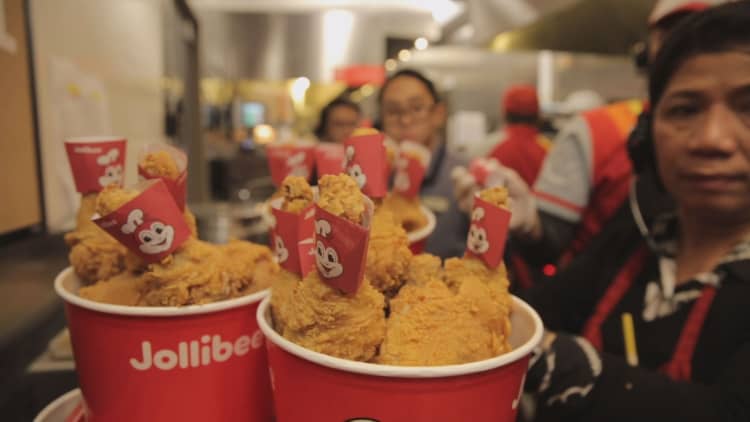In the next eight to 10 years, Restaurant Brands International plans to surpass 40,000 locations globally, increasing its store count by 55% in a move to become one of the world's largest restaurant companies.
The parent company of Burger King, Popeyes Louisiana Kitchen and Tim Hortons had 25,809 locations open as of March 31. McDonald's is nearly at 40,000 stores already, with 37,971 open at the end of the first quarter. Yum Brands is nearing 50,000 locations with the global expansion of Taco Bell, KFC and Pizza Hut.
Toronto-based Restaurant Brands opened 1,300 locations last year, the equivalent of a new store every seven hours. More than 900 of those openings were new international Burger King locations; 260 were in China and Russia.
To reach its goal of 40,000 stores in the next decade, it would need to add roughly 1,400 stores annually, Chief Operating Officer Josh Kobza said at the company's investor day Wednesday.
"RBI is fundamentally a growth company, with three amazing, iconic brands that we believe have a very long runway for growth — both at home and around the world," CEO Jose Cil said in a statement Wednesday.
Restaurant Brands was formed five years ago by the Brazilian investment group 3G Capital, also known for creating Kraft Heinz and Anheuser-Busch InBev. 3G Capital has a 41% stake in the company. The group is know for a focus on cost-cutting, but Restaurant Brands has the additional benefit of being able to franchise its stores, enabling it to expand its global footprint quickly while being cost effective.
Since the start of the year, the company's stock has gained nearly 27%, pushing its market value to more than $30 billion. At that level, the company's value is about even with Yum Brands', but it is still a fraction of McDonald's $152.6 billion market capitalization.
It is unclear if the 14,200 additional stores will be spread equally across its three brands. With 17,823 stores at the end of March, Burger King has more than triple the number of stores as Tim Hortons, the company's second largest chain. Popeyes, which RBI acquired two years ago, had 3,120 at the end of its first quarter.
Restaurant Brands had previously announced plans for Tim Hortons' expansion in China. The Canadian coffee chain accounted for nearly 60% of its first-quarter revenue, but growth in its home market is slowing. It will join Starbucks and the soon-to-go-public Chinese chain Luckin Coffee in the battle to win over customers in the rapidly expanding Chinese coffee market. Tim Hortons plans to open 1,500 locations across the country in the next decade.
Tim Hortons' same-store sales declined its first quarter. In comparison, Burger King's 2.2% same-store sales increase and Popeyes' 0.6% indicate that the brands are still growing. However, both chains' same-store sales growth has slowed from last year, which could be a potential cause for concern.
In the U.S., other fast food chains have also seen growth slow as consumer tastes change to favor healthier options. International expansion has also posed a challenge to some due to differences in regional tastes and difficulty translating the brand to a new market.

Correction: A previous version of this story misstated Restaurant Brands' same-store sales during the first quarter.


